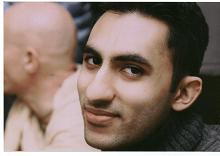
Went to see the Namesake last night, Mira Nair's well-made film adaptation of Juhmpa Lahiri's superbly written novel.
The film chronicles the Ganguli family, tracing their journeys from the arranged marriage of Ashima and Ashok to the relationship issues that haunt their son Gogol. Tabu was amazing as Ashima, Irfan Khan played a subtle and admirable Ashok, and Kalpen Modi (Harold and Kumar's Kal Penn if your prefer) did a decent job being Gogol, although at times he seemed to revert back to playing Kumar the stoner kid. Anyway, the film differed from the novel in many significant ways, and I honestly found myself a bit disappointed at times. But still the crux of the theme came through powerfully, and the film sparked a lot of interesting thoughts and ideas without succumbing to the usual "Alas, am I Indian or American?" formula.
Although religion was only present in the film in certain external or superficial ways, I thought that a subtle but profound kind of spirituality permeated the film. At one point, when a teenage Gogol visits Calcutta, he looks out the window and is drawn to the singing of some Baul wanderer below. It is a quick moment and it passes, but I think that wandering spirit is still present throughout the film, hiding behind all the mundane questions and tensions.
As both an ABCD and a card-carrying Hare Krishna, how can I not be fascinated by identity issues and generational or cultural shifts?
 Not surprisingly, a short -- seemingly insignificant -- sentence in the novel (not depicted at all in the film) drew my attention. The author described how Ashima, a recently arrived immigrant housewife walking around 1970s Boston while her husband was at work, would sometimes pass the "Hare Krishnas pestering her with their literature."
Not surprisingly, a short -- seemingly insignificant -- sentence in the novel (not depicted at all in the film) drew my attention. The author described how Ashima, a recently arrived immigrant housewife walking around 1970s Boston while her husband was at work, would sometimes pass the "Hare Krishnas pestering her with their literature."Somehow I doubt that in those brief encounters either Ashima (who will soon raise two Indian-American kids) or the probably-over-zealous Krishna devotees (themselves American born "children" of a Bengali immigrant) realized just how much their lives had in common.
.v.
PS: While we were watching the film at the Angelika in Greenwich Village, this was going on a few blocks away.




